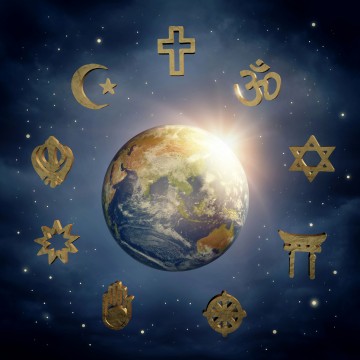

Year 12 Religion & Society Units 3 and 4
Overview
Units 3 and 4 Religion and Society explore religions’ dynamic interaction with society.
The role of religions is revealed through an in-depth analysis of one religion: for VSV this is Shia Islam. Less than 20% of Muslims adhere to Shia Islam but it is a dominant force in the world, holding the potential to either enhance world peace or trigger global conflict.
Unit 3 explores the way religions answer questions, such as, where did we come from, what happens when we die, and how should we live. We see that all religions have developed unique stories, rituals, symbols, ethical codes, social networks and beliefs as a response to this quest for meaning.
The purpose of religions is highlighted when people encounter experiences that cause suffering, confusion, joy or insight. These extreme experiences may lead to people questioning, strengthening or altering their religious beliefs.
Many inspirational people gain their strength from their religious faith. We focus on Shirin Ebadi who was awarded the Nobel Peace Prize for a lifetime of promoting human rights and particularly women’s rights within the context of Shia Islam.
Unit 4 focuses on the interaction between religions and societies, over time. There is often tension between religions and societies so religions need to be creative in how they maintain authority and influence over their members. Religions need to change to survive but if they change too much to fit into society then they may lose their identity and fade away.
We explore significant challenges faced by Shia Islam, such as antagonism from Sunni Islam and disapproval from the women’s rights movement.
Unit 4 ends with a focus on the anti-hijab protests that erupted in Iran in late 2022 with the death in police custody of Mahsa Amini.
Religions stimulate, support and change societies.
How they adapt to our current challenges will determine our future.
Who is it for?
This subject intersects many academic fields and so would benefit students who plan to go on to study History, Politics, Psychology, Sociology, Philosophy, Archaeology, Literature, the Arts, Law or Education.
What do you do?
Some activities students will complete are: quizzes to consolidate key knowledge; discussions with class members; interpretation of the world views presented in cartoons; analysing extracts from religious texts and the observations of scholars of religions; evaluating the significance of challenges to religions.
What skills do you need?
The main skill students need to bring to this subject is a desire to understand human thought and behaviour with empathy and objectivity.
What skills do you develop?
In Religion and Society, we appraise religion for its potential to benefit or detract from individual well-being and the future of humanity.
The study develops lateral thinking skills, the ability to consider diverse and unconventional perspectives to solve problems.
The course aims to advance memorisation techniques, interpretation of texts, ability to write concisely and precisely and, most importantly, understanding of others.
Requirements
Internet access is required.
Students do not need to purchase any items for this subject.
Things to think about
Religion and Society is entirely assessed through written responses so it does require solid skills in literacy. However, if students are prepared to dedicate regular time to the subject, they will be guided in how to memorise facts and how to express their insights in concise responses supported by precise evidence.
Students need to commit to at least 5 hours a study a week to benefit from this subject. Written tasks need to be submitted to teachers for feedback each week.
Things you can do now
There are many things students can do to prepare you for this subject.
Interview people about their worldview
Ask at least four people about how they answer the following questions:
- How do you decide right from wrong behaviour?
- What do you think happens to people after death?
- How do you think your ideas about these questions formed?
Before beginning your interviews, consider how important it is for your interviewees to feel safe and accepted, no matter how surprised you may be from their answers. For all of us, our worldviews and beliefs are central to our identity, so even if we strongly disagree with the ideas of others we need to listen with a non-judgemental and empathetic state of mind.
Watch and take notes
Watch the following short videos, more than once. Take notes to consolidate a fundamental understanding of Shia Islam.
How Islam Began-In Ten Minutes
- Record three points about the Kaaba.
- Explain the role of the Angel Jibril/ Gabriel.
- Explain how the ruling families of Mecca responded to Muhammed claiming that he was a prophet of the one true God.
Islam, the Quran, and the Five Pillars: Crash Course World History #13
- Identify the two main themes of the Quran.
- Identify the five pillars of Islam. Explain the obligation of each pillar.
- Write three points about the Mecca.
Iran’s Revolutions: Crash Course World History 226
- Explain the historical difference between Sunni and Shia Islam- this is a dispute about leadership
- Record three points about the 1979 Revolution in Iran.
- Record three points about Ayatollah Khomeini
Things to have a look at
History of Ideas- Religions
This 10-minute video provides an overview of the history of world religions and the role they play in the human search for meaning.
Mecca- National Geographic
This 4-minute video explains the Muslim Hajj to the Kaaba in Mecca.
What does it mean to be a feminist in Islam?
This 4-minute video introduces the challenge to Islam from the women’s rights movement.